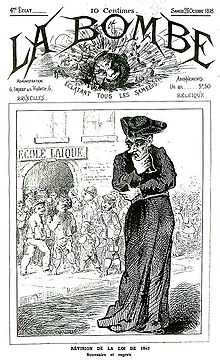First School War

The First School War (French: Première guerre scolaire, Dutch: Eerste schoolstrijd) was a political crisis in Belgium over the issue of religion in education. The School War marks the high water mark of the conflict between the conservative Catholic Party, and the secular Liberal Party. The war lasted from 1879 to 1884 and resulted in a period of nearly fifty years of Catholic political dominance. It was followed by a Second School War between 1950 and 1959.
Background
In the preceding centuries, education in Belgium had been dominated by the Catholic church.[1] In 1842, a new education law formalized religious education in primary schools, while also conceding the freedom of education guaranteed in Article 17 of the Constitution of 1831:[2]
| “ | Primary education includes by necessity the teaching of religion and morality... The instruction of religion and morality is placed under the direction of the officials of the religious faith that is professed by the majority of pupils at the school. Children who do not belong to the majority religious group in the school are exempt from participation in this instruction. | ” |
| —Article 6 of the Education Act of 1842[3] | ||
In practice, the interpretation of the law varied and, since the vast majority of the Belgian population was Catholic, the church was allowed considerable influence in schools.[2] The quality and spread of education remained poor and, though declining from 51% in 1843, 39% of the population were still illiterate by 1880.[2]
Crisis
On June 1, 1879, a Liberal majority under Frère-Orban succeeded in passing an Education Act secularizing primary education. Frère-Orban, who was well known for his anti-clerical beliefs, was nicknamed the Papenvreter (or "Papist Biter"). New "neutral" schools were to be established in all municipalities, funded by the local communes with assistance from national government, while Catholic schools were to receive no support at all.[2] The Catholic church encouraged a boycott of the new schools so, though by 1883 3,885 secular schools had opened across the country, attendance in private Catholic schools had risen from 13% to over 60%.[4]
In 1884 after fresh elections, a Catholic government under Jules Malou passed a new Education Law providing public support for religious schools and, in 1895, religious education became compulsory in all schools.[2]
Legacy
The resistance to the Liberal anti-Catholic legislation revitalised the Catholic Party and led to its re-election under Malou in 1884 and marked the start of a period of nearly unbroken government by the Catholic Party until 1917. Disputes over religion in education continued, extending to university education, where secular universities like the Free University of Brussels competed with Catholic universities like the Catholic University of Leuven.
In an 1881 encyclical to Belgium, Licet Multa, issued before the resolution of the crisis, Pope Leo XIII praised the opposition of Catholics to the education act: "It is pleasant for us to give special praise to your solicitude in encouraging by all the means possible a good education for the young, and in insuring to the children of the primary schools a religious education established on broad foundations."[5]
In 1914, primary education (between the age of 6 and 14) was declared compulsory and free, and, by then, the level of illiteracy had fallen to 8%.[2]
See also
- The Second School War (1950–59)
- The Jules Ferry laws, laws establishing secular education in France, 1881-2
- The German Kulturkampf (1871-8), about secularism in politics.
References
- ↑ Schama, Simon (1972). "The Rights of Ignorance: Dutch Educational Policy in Belgium 1815-30". History of Education 1 (1): 81–9. doi:10.1080/0046760720010106.
- ↑ 2.0 2.1 2.2 2.3 2.4 2.5 Galloy, Denise, Hayt, Franz (2006). La Belgique: des Tribus Gauloises à l'État Fédéral (5th ed.). Brussels: De Boeck. p. 139. ISBN 2-8041-5098-4.
- ↑ Galloy, Denise, Hayt, Franz (2006). La Belgique: des Tribus Gauloises à l'État Fédéral (5th ed.). Brussels: De Boeck. pp. 138–9. ISBN 2-8041-5098-4.
- ↑ Cook, Bernard A. (2004). Belgium: a history. New York [u.a.]: Peter Lang. p. 79. ISBN 0820458244.
- ↑ "Licet Multa: Encyclical of Pope Leo XIII on Catholics in Belgium". The Vatican. Retrieved 22 January 2014.
Further reading
- Pierce, Julian (December 1921). "The School Question in Belgium". The Elementary School Journal 22 (4): 290–297. doi:10.1086/455133. Retrieved 15 December 2012.